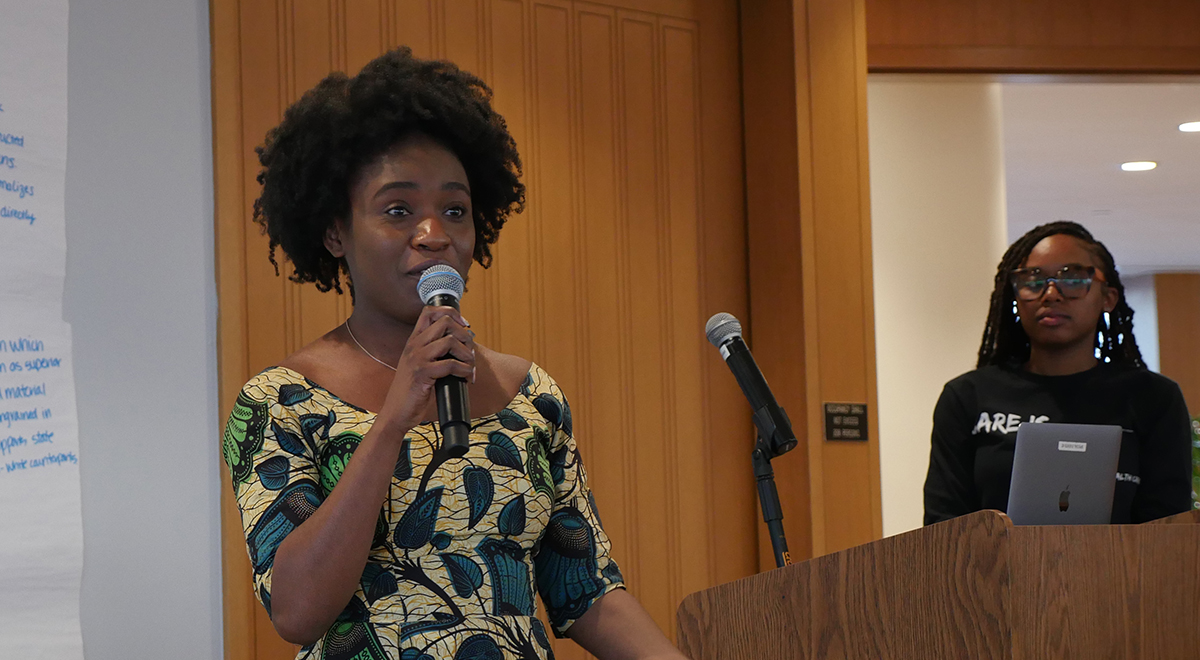Students, Faculty Discuss Civil Rights at Workshop Honoring Martin Luther King

By Rose Chen ’26
“The Cry Is Always the Same: We Want To Be Free,” held in the Daniel Family Commons was this year’s Black History Month event organized to honor the legacy of Martin Luther King Jr.
Featuring protest songs and discussions about the civil rights issues that affect Black people today—and other groups across time—the Feb. 21 gathering was a participatory workshop that brought students and faculty together.
The Resource Center, the Office for Equity and Inclusion, the Department of African American Studies, the Center for African American Studies, and Olin Memorial Library sponsored “The Cry is Always the Same” as part of an annual series.
“I think it’s so important anytime we’re doing commemorations or like this [event] where we’re bringing up the past and talking about current present circumstances, … to look at those practices that people before us did right and keep on renewing them and bringing them back into our own context,” said Resource Center Director Demetrius Colvin, who joined attendees in singing “I Love Everybody,” a church hymn and protest song. “We can do that in so many different ways, like learning protest songs and things like that. This commemoration is an honor of the legacy of Reverend Dr. Martin Luther King Jr., who had also a special relationship with Wesleyan University, receiving an honorary degree and speaking here four different times.”
Colvin also talked about changes to the MLK workshop. Previous events highlighted education and voting issues. This year, the focus was incarceration.
Dean for Academic Equity, Inclusion, and Success and Interim Vice President of Equity and Inclusion April Ruiz spoke to the urgency of using the resources Wesleyan has to offer to make education systems for equitable.
“As the histories and the struggles of Black folks and Black communities are being erased from our classrooms, as Black families and communities are in pain and sadness and anger around the violence and systemic violence that is committed against their children and neighbors and loved ones, we cannot be still and we cannot be silent,” Ruiz said. “This is true, but it’s also true that for some of us, this is a time for listening first and not jumping into action right away, for learning how to serve the communities who need the most care and who need to be centered in this moment to learning from those communities who have been underserved, left behind, and have been marginalized for centuries.”
After a performance of the Black National Anthem by Oluchi Chukwuemeka ’26 and a video streaming of King’s 1964 Baccalaureate Address, Connecticut Black and Brown Student Union (BBSU) Executive Director Shineika Fareus and Membership and Outreach Manager Andriana Milner discussed their work, which is centered around educational justice and the impact of the school-to-prison pipeline on Black communities.
The pair began by defining three terms that were critical to their work: abolition, anti-Blackness, and white supremacy. At the BBSU, abolition is an organizing framework that seeks to get rid of oppressive systems and institutions and envisions what can replace them to create the world one wants live in. Anti-blackness is a systemic aversion to Black people and Blackness as constructed through white supremacist lens, creating a system that normalizes whiteness and equates Blackness as direct opposite. White supremacy is a system in which whiteness is centralized and seen as superior.
“This dynamic is ingrained in the fabric of our society and supports the state of violence that particularly affects nonwhite counterparts,” Fareus said. “So this is our definition as an organization, how we can have these conversations. It gets so much deeper than that and how we go about it.”
Fareus led workshop attendees in exercises envisioning a different world and the impact those differences would have on conversations of abolition, incarceration, anti-Blackness, and white supremacy. Students and faculty then worked together in groups during a community mapping exercise to discuss which aspects of modern society they would take with them to this different world, and how they would solve problems like accountability and crime without perpetuating the same systems of harm that exist today.
“It feels so good to be able to be here and have these conversations about these terms so freely and people are not feeling offended by that,” Fareus said. “People are getting ostracized for saying the term ‘white supremacy,’ something that we did not create but are victim of, and now we can’t talk about it because it’s exposing who those people are, right? So I just want to say thank you to Wesleyan… because there’s a lot of institutions right now that I couldn’t stand here today to have these conversations and I just want to acknowledge that. In the midst of all the chaos, we appreciate this moment.”

